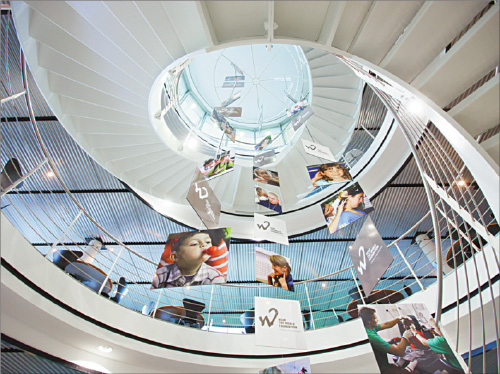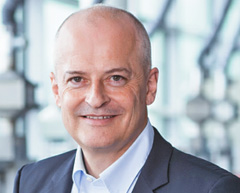 |
|
Sonova's cochlear-shaped headquarters in Stafa, Switzerland, helps the company to realize its mission of "hear the world". [Provided to China Daily] |
Strong emotional reasons to drive expansion, says Sonova chief
Despite being the world's largest hearing care services provider, the Switzerland-based Sonova Group believes that it has its task cut out in China, especially to sustain growth on a long-term basis
Hearing care is a special need, which is not only attractive from a business perspective, but also from the strong emotional connections it provides, said Lukas Braunschweiler, chief executive officer of Sonova.
|
 |
|
Lukas Braunschweiler CEO of Switzerland-based Sonova Group. [Provided to China Daily] |
It is important for companies like Sonova to not only listen to what the customers really want, but also concentrate on raising awareness in China about the treatment available for various hearing disorders.
"People need a lot of support in China. I think innovation can yield lots of returns," Braunschweiler said during a recent trip to Beijing. The CEO mentioned that though China is currently the Swiss company's second-largest market in Asia, his frequent trips to the country are more with an eye on raising market awareness, rather than just selling products.
"There is no doubt that the market (in China) has immense growth potential," he said, adding that the Asia - Pacific region accounts for about 11 percent of the total business, with China being one of the mainstays.
"We have around 27 million people in China who could benefit from a hearing aid or a cochlear implant. Everybody in China could have a solution if they want. So the potential is obviously there," said Braunschweiler.
Though the potential exists, the country still lags in the ratio of people suffering from hearing impairments to those who undergo hearing correction, the CEO said.
The penetration level in China is rather low at about 5 percent, while the average in Europe, or North America, is around 20-25 percent.
According to Braunschweiler, the challenge for Sonova does not come in the form of product distribution, but more in reaching out to people who need expert guidance from professional audiologists.
"You cannot buy hearing instruments in a supermarket and fix it yourself. You need a professional service or expert who conducts a hearing test and then helps you with fittings and usage," said Braunschweiler, adding that China does not have enough hearing care professionals.
In addition, hearing aids and cochlear implant are products that need to be backed with long-term services, requiring brands to invest more in sustainable growth.
To illustrate his point, Braunschweiler cites an incident that he learned about from one of the employees in China.
"There was a 70-year-old retiree in a small county of Liaoning province who had lost hearing ability for several years and was suffering. His children bought him a hearing aid and soon he could hear voices again. But his excitement faded, when the device malfunctioned and he was unable to hear again. However, after simple checkups by the audiologists, it was discovered that there was nothing wrong with his hearing aid and the fault was due to the accumulated dirt.
"Lack of awareness about hearing disorders and the shortage of professionals who can provide quality consultancy and hearing care have contributed to the challenges in wearing and using hearing instruments," he said.
